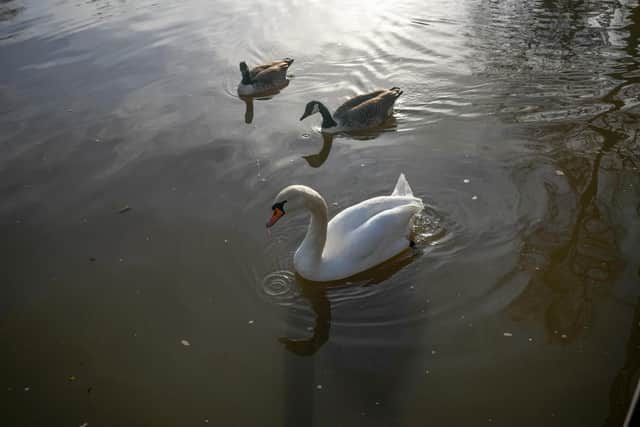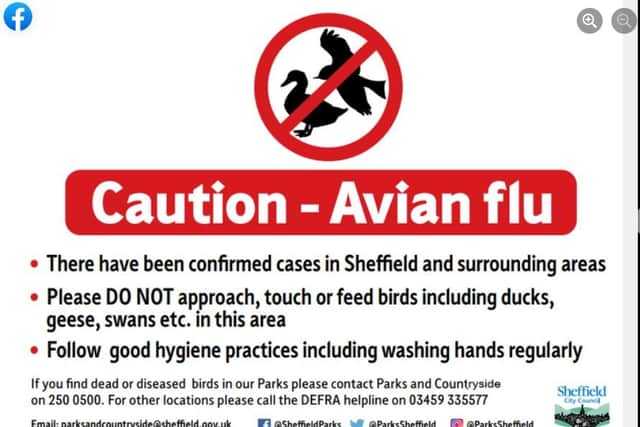Bird flu Sheffield: Warning signs for avian flu go up in parks across Sheffield as first cases found in city
and live on Freeview channel 276
Sheffield City Council said residents would start to see the posters appearing in green spaces across the city on Friday, January 21.
It comes after the first cases of the disease were discovered in dead birds last week.
Advertisement
Hide AdAdvertisement
Hide Ad

Ian Ashmore, Head of Environmental Regulation at Sheffield City Council, said: “There have been multiple findings of Avian flu in dead wild birds from sites across Great Britain. This week we have had the first positive cases in dead birds in Sheffield. These were a Canada goose, a swan and a gull. If anyone finds a dead or visibly sick bird they should not touch it. For dead birds in Sheffield parks, please call us on 0114 2500500.
"For other locations please call the DEFRA helpline on 03459 335577. DEFRA will then collect some of these birds and test them to look at the way the disease is spreading and the types of birds involved. Not all birds will be collected. Wild birds are susceptible to a range of diseases and injuries and, of course, not all dead birds will have been infected with avian influenza.
“Signage is going up in parks to warn visitors to avoid contact with wild birds and for people to wash their hands frequently, however we would repeat that the risk to humans is extremely low.”
There have now been more than 66 confirmed cases of avian flu in domestic birds in England.
Advertisement
Hide AdAdvertisement
Hide Ad

The Department for Environment, Food and Rural Affairs (DEFRA) is encouraging all keepers to register their birds with them, and keep contact details up to date, so that they can contact owners quickly if there is a disease outbreak in an area and if action needs to be taken.
An Avian Influenza Prevention Zone (AIPZ) came into force across Great Britain in November last year and means bird keepers must still:
house or net all poultry and captive birds to keep them separate from wild birds
cleanse and disinfect clothing, footwear, equipment and vehicles before and after contact with poultry and captive birds – if practical, use disposable protective clothing
Advertisement
Hide AdAdvertisement
Hide Adreduce the movement of people, vehicles or equipment to and from areas where poultry and captive birds are kept, to minimise contamination from manure, slurry and other products, and use effective vermin control
thoroughly cleanse and disinfect housing on a continuous basis
keep fresh disinfectant at the right concentration at all farm and poultry housing entry and exit points
minimise direct and indirect contact between poultry and captive birds and wild birds, including making sure all feed and water is not accessible to wild birds
Advertisement
Hide AdAdvertisement
Hide AdThe UK Health Security Agency (UKHSA) has said avian flu is primarily a disease of birds and the risk to the general public’s health is very low, although one case has been recently found in south-west of England.
However, the agency is assuring people that cases like this are extremely rare.
The Food Standards Agency has said that on the basis of the current scientific evidence, avian influenza poses a very low food safety risk for UK consumers. Properly cooked poultry and poultry products, including eggs, are safe to eat.
If bird keepers have more than 50 birds, they are legally required to register their flock within one month of arrival at their premises.
Those with less than 50 birds, including pet birds, are strongly encouraged to register them.

